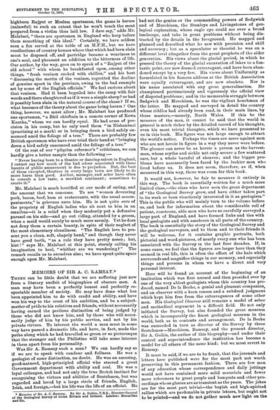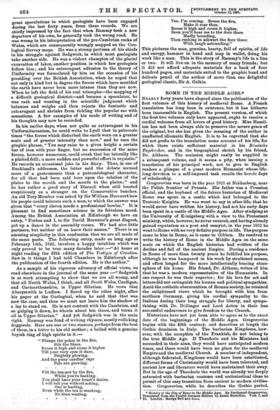MEMOIRS OF SIR A. C. RAMSAY.*
THERE can be little doubt that we are suffering just now from a literary surfeit of biographies of obscure men. A man may have been a perfectly honest and perfectly re- spectable member of society. He may have done what has been appointed him to do with credit and ability, and have won his way to the crest of his ambition, and be a subject- matter of pride to his relatives and friends, without necessarily having earned the perilous distinction of being judged by those who did not know him, and by those who will neces- sarily judge of him by his public service, and not by his private virtues. To interest the world a man must in some way have passed a dramatic life, and have, in fact, made the paths along which he had travelled so green or so picturesque that the stranger and the Philistine will take some interest in them apart from his personality.
Was Sir A. Ramsay such a man? We can hardly say so if we are to speak with candour and fullness. He was a geologist of some distinction, no doubt. He was an amusing, good-natured, high-principled official who steered a great Government department with ability and zeal. He was a loyal colleague, and had not only the true Scotch instinct for recognising the virtues and abilities of Scotchmen, but was regarded and loved by a large circle of friends, English. Irish, and foreign,—but his life was the life of an official. He
• Memoirs of Sir A. C. Ramsay. By Sir A. Geikie, P.R.S., Director-General of the Geological Survey of Great Britain and Ireland. London: Macmillan and Co.
had not the genius or the commanding powers of Sedgwick and of Murchison, the Stanleys and Livingetones of geo- logical exploration, whose eagle eye could see over a broad landscape, and take in great problems without being dis- tracted by the details in the foreground. He mapped and planned and described what he saw with precision and skill and accuracy ; but as a speculator or theorist he was on a different level altogether from the great prophets of the older generation. His views about the glacial period, in which he pressed the theory of the glacial excavation of lakes to a fan- tastic point, are now deemed extravagant, and have been aban- doned except by a very few. His views about Uniformity as formulated in his famous address at the British Association were equally extravagant, and are now obsolete. Nor is his name associated with any great generalisation. He championed pertinaciously and vigorously the official view of disputed problems ; and in the memorable struggle between Sedgwick and Murchison, he was the vigilant henchman of the latter. He mapped and surveyed in detail the country whose riddles had already been read, in their main lines, by those masters,—namely, North Wales. If this be the measure of the man, it cannot be said that the world in general is much richer by the detailed record of his thoughts, even his most trivial thoughts, which we have presented to us in this book. His figure was not large enough to attract the world's notice. Perhaps the times are more against men who are not heroic in figure in a way they never were before. The gleaner can never be as heroic a person as the harvest- man, whose scythe and sickle not only secure a few scattered ears, but a whole barnful of sheaves ; and the bigger pro- blems have necessarily been faced by the luckier men who lived before us. It does not seem, therefore, as if, when measared in this way, there was room for this book.
It would not, however, be fair to measure it entirely in this way. The book is essentially written for a much more
limited class,—the class who have seen the great department of "the Geological Survey grow, and have either taken part in its work or been vicariously interested in it as geologists." This is the public who will mainly turn to the volume before us, and look for information about the considerable roll of patient, courteous, able men who have so carefully surveyed a large part of England, and have formed links and ties with local geologists and with amateurs in all parts of the country. The book is essentially the story of the Geological Survey and the geological surveyors, and to them and to their friends it will be welcome, for it contains graphic portraits, both pictorial and word-pictures, of nearly every one who has been
associated with the Survey in the last four decades. If, in some cases, we feel that the figures are larger here than they
seemed in real life, this is often the effect of the halo which surrounds and magnifies things in our memory, and especially things and persons in whom we have a direct and very personal interest.
Here will be found an account of the beginning of an institution which was first nursed and then presided over by one of the very ablest geologists whom this country has pro- duced, named De la Beebe, a genial and pleasant companion, and an observer with a keen reason and a subdued judgment which kept him free from the extravagances of some other men. His Geological Observer still remains a model of sober and methodical argument in a difficult field. He not only initiated the Survey, but also founded the great museum which is incomparably the finest geological museum in the world, both as to contents and arrangement. De la Beche was succeeded in turn as director of the Survey by three Scotchmen—Murchison, Ramsay, and the present director, Sir A. Geikie, the author of this biography—and under their control and superintendence the institution has become a model for all others of the same kind; but we must revert to Ramsay.
It must be said, if we are to be frank, that the journals and letters here published were for the most part not worth preserving in this permanent fashion. There are few men of any education whose correspondence and daily jottings would not have contained more solid materials and fewer mere references to great people and banquets and other pro- ceedings whose glories are as transient as the years. The jokes are for the most part trivial—the boyish and high-spirited rallies which are pardonable in private lettere, but ought not to be printed—and we do not gather much new light on the
great speculations in which geologists have been engaged during the last forty years, from these records. We are chiefly impressed by the fact that when Ramsay took a new departure of his own, he generally took the wrong road. He was wrong in his interpretation of the pre-Cambrian rocks of Wales, which are consequently wrongly mapped on the Geo- logical Survey maps. He was a strong partisan of his chiefs in his struggle against Sedgwick, in which most geologists take another side. He was a violent champion of the glacial excavation of lakes, another position in which few geologists follow him ; and his extravagant adhesion to the theory of Uniformity was formulated by him on the occasion of his presiding over the British Association, when he urged that not only in kind but in degree the forces which have moulded the earth have never been more intense than they are now.
When he left the field of his real triumphs—the mapping of a difficult geological district—and became a speculator, he was rash and wanting in the scientific judgment which balances and weighs and then rejects the fantastic and extravagant and shrinks from tickling the popular ear with sensations. A few examples of his mode of writing and of his thoughts may now be recorded.
In his earlier days, when not quite so extravagant in his Uniformitarianism, he could write to Lyell that in pala3ozoic times "the forces which disturbed the earth were on a greater scale and of greater intensity than now," and he uses the graphic phrase, " Yon may raise to a given height a certain bar of iron with your finger, but no succession of the same forces, however numerous, could crush that bar laterally like a plaited frill ; a more sudden and powerful effort is requisite."
He records an occasional joke in his diary. Thus, in one of Buckland's addresses, the latter said the debate seemed more of a gastronomic than a palaeontological character, for all that had been said bore upon the relation of the
plates to the month and the mouth to the plates;" and he has rather a good story of Disraeli when still treated suspiciously as a stranger on the Conservative benches. An old Tory Member was asked by Sir William Harcourt how his people could tolerate such a man, to which the answer was given that " every eleven needs a professional bowler." It is pleasant to find sometimes science in its frivolous mood. Among the British Association at Edinburgh we have an entry, " Forbes and I, to Sir David Brewster's great disgust, got up a dance in the assembly rooms. We had nice little partners, but neither of us knew their names." There is an amusing simplicity in this confession that we are all made of
the same paste. The following entry, made as long ago as February 14th, 1842, involves a happy intuition which was only proved to be true many decades later :—" At home at night reading the fifth edition of The Vestiges of Creation. Saw in it things I had told Chambers in Edinburgh after the publication of the fourth edition. He is the author."
As a sample of his vigorous advocacy of official views, we read elsewhere in the journal of the same year :—" Sedgwick is at work attempting to show that we are all wrong, and that all North Wales, I think, and all South Wales, Cardigan, and Carmarthenshire, is Upper Silurian. He vows that Aberystwith is Ludlow. I flared up the other night, after his paper at the Geological, when he said that that was now the case, and thus we must not leave him the shadow of a leg to stand on. He is not content with the Cambrian, and so gulping it down, he wheels about ten times, and turns it all in Upper Silurian." And yet Sedgwick was in the main right. Ramsay was fond of writing rhymes, mostly rollicking doggerels. Here are one or two stanzas, perhaps from the best of them, in a letter to his old mother; a ballad with a genuine boyish ring of high spirits in it :— " Plunge the poker in the fire, Stir the blaze.
Rouse it high and rouse it higher Till your very eyes it daze, Brightly glowing. And the puny candles' rays Pale are growing.
Fill the tea-pot by the fire, While you're basking.
You shall have your heart's desire. I will tell you without asking, One is basting, Even while the tea is masking, No time wasting. Yes, I'm coming. Rouse the fire, Make it roar then.
Rouse it high and rouse it higher, Soon you'll hear me to the door there Madly bounding, Then rushing in athwart the floor there With laugh astounding."
This pictures the man, genuine, hearty, fall of spirits, of life and energy, hammer in hand and map in wallet, doing his work like a man. This is the story of Ramsay's life in a line or two. It will live on in the memory of many friends; but it did not afford adequate materials for a book of four hundred pages, and materials suited to the graphic hand and delicate pencil of the author of more than one delightful geological classic, Sir A. Geikie.



















































 Previous page
Previous page